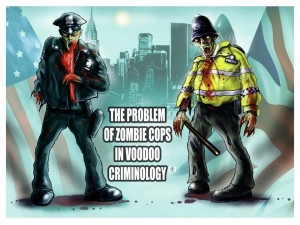A Most Embarrassing British Supermyth is Bust
By Mike Sutton. Britain has been in the international news quite a lot recently. Not least for the involvement of some of its citizens and big businesses in unethical scandals. We’ve had the British Petroleum (BP) oil spill mess in the USA, mass involvement of our politicians in submitting fraudulent Parliamentary expenses claims, Barclays Bank in illegally fixing interest rates, News of the World in celebrity and crime victim phone hacking, and HSBC involved in money laundering.
It may not be an unethical scandal, but in the opinion of this correspondent, Britain is involved in another rather embarrassing national and international screw-up. Namely, that many British academics, journalists, politicians, civil servants and senior police officers have been misleading the world for the past 28 years regarding British Government research into police effectiveness.
In the USA, Britain and Canada, national government and individual police force-level policing policy regarding the effectiveness of foot patrol beat policing at tackling and reducing crimes such as burglary has been influenced on how best to fight crime by a mere pencil and paper ‘back of an envelope’ arithmetical exercise, conducted by the British Home Office, which claims that: A patrol officer in London could expect to pass within 100 yards of a burglary only once every 8 years, but might not even realise that the crime was taking place.”
The problem is that not only is this weighty, British Home Office, national government claim based upon a mere ‘back of an envelope’ calculation but also it is based upon three completely unrealistic premises one of which is that, effectively, all foot patrolling beat police officers are headless zombies with less ability to react to stimulus than a single-celled paramecium. This myth busting of the claim is based upon primary source research findings that My colleague Dr Phillip Hodgson and I have published regarding what we have named the Zombie Cop Myth on the Best Thinking website.
Most embarrassingly, a review of the published literature citing the above claim reveals that many influential academic authors, journalists, leading police officers and politicians wrongly, yet credulously, appear to have believed that the British Home Office claim was based upon empirical research involving a real study of real police officers. See: Clarke and Hough 1988 for just one of a multitude of official sources promoting the above claim as important policy-oriented knowledge.
Our published Zombie Cop Myth article currently lists 45 publications that unquestioningly cite the claim as though it is based upon veracious knowledge. We have in fact found a total of 79 at the latest count, and we expect to find many more. Some authors citing the claim appear to be quite prolific. At the time of writing, this same article is undergoing extensive expert academic, line, and police executive open peer review for an international criminology journal.
Further academic papers on the extent of the prevalence of this pathological supermyth will follow. Moreover, we intend to conduct an academic research study to seek to understand why this myth was so widely believed and disseminated.
What is a supermyth?
What sets supermyths such as the Zombie Cop Myth apart from other fallacies and myths serves as a unique and timely warning for those promoting the virtues of skeptical inquiry, because the great irony is that, unlike ordinary myths, supermyths are created by respected orthodox scholars and then credulously disseminated by other experts in the spirit of promoting skeptical enquiry. Readers interested in learning about other supermyths might be interested to learn that that the widely believed criminological knowledge that opportunity is a cause of crime is also founded upon completely irrational premises. See: Opportunity does not make the thief.



